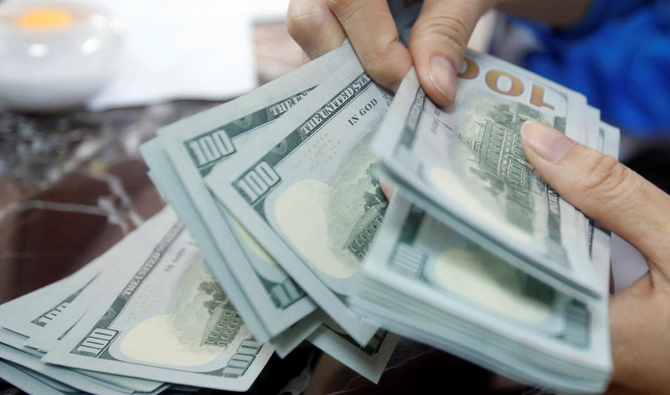
- ARAB NEWS
- 06 Jul 2025

Whatever happens in the coming US presidential election, it looks as though one enduring legacy of the Trump era will be the decline of the dollar as the world’s chosen currency for trade.
If Democratic candidate Joe Biden wins — as the polls indicate is increasingly likely — the decline of the once-mighty greenback may slow a little, but if President Donald Trump is victorious it will accelerate. Either way the damage has been done to the world’s favorite currency.
This is not to say that the dollar will cease to be the unofficial reserve currency, nor that many countries — including most of the Arabian Gulf states — will continue to find good reasons for pegging their currencies to the dollar.
Nor is it any judgement of the value of the currency, which has been depreciating gently against most others for the past few months though not fast enough to cause any great alarm.
But the big trading powers of the world — China, Japan, India, and Russia in particular — will increasingly find other financial conduits through which to do their business. The process has started already.
The respected Japanese journal the Nikkei Asia Review recently published a study based on an analysis of records from the Russia central bank and customs authorities which found that, in the first quarter of this year, the amount of trade between Russia and China paid for in dollars fell to below 50 percent for the first time ever.
Only 46 percent of trade was settled in the US currency, with the euro rising to an all-time high of 30 percent and Russian and Chinese currencies at a record 24 percent. In 2015, 90 percent of trade between them was settled in US dollars, Nikkei found.
The decline began in 2014, before Trump was elected, when Russia and China signed an economic co-operation pact as Moscow became disenchanted with the West following the reaction to its annexation of Crimea.
That year, the two countries signed up to a currency swap deal which allowed them to use each other’s currencies without having to buy it (in dollars) on foreign exchange markets.
But since 2016, China — feeling the brunt of Trump tariffs as part of his trade confrontation — has found an increasingly strong common interest with Russia. The swap deal was extended in 2017 and is up for renewal this year. It looks pretty certain it will be renewed and enlarged.
In 2019, when Chinese President Xi Jinping visited Moscow, he signed an agreement with the Russians to carry out their trade without use of the dollar, and began to co-operate on ways to sidestep the SWIFT payments system by developing their own alternative to the dollar-dominated network.
It is not just the use of tariffs and sanctions that has increasingly bugged China. Its resentment has been further stirred — as was Russia’s — by the fact that the US used its command of the dollar markets to punish individuals and corporations for what were regarded as political reasons.
Because of the dominant position of the dollar in the world, all international transactions at some stage have to go through US banking authorities. The Americans were using this fact to close bank accounts and blacklist businessmen and corporations they did not like.
Russia and China decided there was no way the US Federal Reserve should be involved in the financing of a shipment of goods across Siberia, and you can see their point.
For the time being, the greenback will live with being cold shouldered in Moscow and Beijing. Trade between Russia and China is growing but is still not that big in global macro terms to make much difference to the dollar’s standing.
But if others join in, the effect could snowball. Most European governments do not have much time for Trump and might seek to capitalize on dollar difficulties to improve the international standing of the euro.
From time to time, there have been grumblings in the Middle East about the pricing of the global oil market in US dollars, but it seemed too much trouble, and possibly upsetting to their American allies, for any policymakers in the region to attempt a serious alternative market.
Despite the Russia-China financial pact, there is as yet no concerted global campaign to get rid of the dollar — just an increasing wariness about dealing with an unpredictable president who uses the currency as a weapon.
• Frank Kane is an award-winning business journalist based in Dubai. Twitter: @frankkanedubaiUS